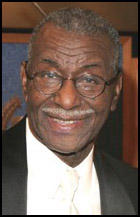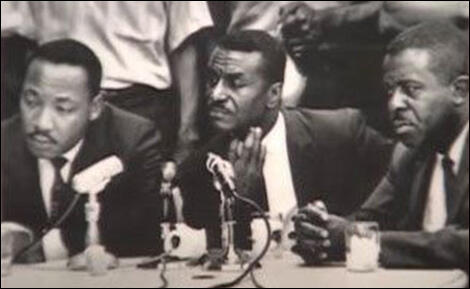Fred Shuttlesworth

Fred Lee Robinson was born in Mont Meigs, Alabama, on 18th March, 1922. His mother, Alberta Robinson, later married William Shuttlesworth, a farmer. He worked as a labourer and a truck driver before graduating from Selma University (1951) and Alabama State College (1952). In 1953 Shuttlesworth became pastor of the Bethel Baptist Church.
In May 1956 Shuttlesworth established the Alabama Christian Movement for Human Rights (ACMHR). In December, 1956, the Supreme Court ruled that bus segregation in Montgomery was illegal. Immediately, Shuttlesworth announced that the ACMHR would test segregation laws in Birmingham.
On Christmas Day, 1956, 16 sticks of dynamite exploded under his bedroom window. As his biographer, pointed out: "The following year, he and his wife tried to register their child at a white Birmingham high school. White thugs beat him with a knuckleduster, whips and chains."
In 1957 Shuttlesworth joined Martin Luther King, Ralph David Abernathy and Bayard Rustin to form the Southern Christian Leadership Conference (SCLC). Based in Atlanta, Georgia, the main objective of the SCLC was to coordinate and assist local organizations working for the full equality of African Americans. The new organization was committed to using nonviolence in the struggle for civil rights, and SCLC adopted the motto: "Not one hair of one head of one person should be harmed."
Shuttlesworth's civil rights activities made him a target of white racists and on the evening of 25th December, 1956, Shuttlesworth survived a bomb blast that destroyed his house. The following year a white mob beat Shuttlesworth with whips and chains during an attempt to integrate an all-white public school. During this period Martin Luther King described Shuttlesworth as "the most courageous civil rights fighter in the South".
Godfrey Hodgson has pointed out: "Shuttlesworth always acknowledged King's leadership, and marched and went to jail with him. But when King came to Shuttlesworth's home town for a historic trial of strength with segregation, he did not like being taken for granted. At the climax of the crisis, when pictures of black demonstrators being attacked by police dogs and water cannon were going around the world, King began talks with a group of Jewish businessmen about desegregating their department stores. Shuttlesworth was not told about the talks, and he was not pleased."

In 1960 Shuttlesworth participated in the sit-in protests against segregated lunch counters and in 1961 helped Congress on Racial Equality (CORE) organize its Freedom Rides. When the riders were beaten up in Anniston, Shuttlesworth organised a convoy of 15 cars to rescue them. Later, when the riders were surrounded by a mob of about 1,000 armed white people, Shuttlesworth escorted civil rights leader, James Farmer, to his church. Farmer later recalled: "He was either insane or the most courageous man I have ever met. Shuttlesworth just walked through them, as cool as a cucumber. I think they were intimidated by his boldness."
Shuttlesworth also led the mass demonstrations against segregation in Birmingham and this resulted in him being hospitalized in May, 1963, after being slammed against a wall by water from fire hoses. A few days later it was announced: "1. Within 3 days after close of demonstrations, fitting rooms will be desegregated. 2. Within 30 days after the city government is established by court order, signs on wash rooms, rest rooms and drinking fountains will be removed. 3. Within 60 days after the city government is established by court order, a program of lunchroom counter desegregation will be commenced. 4. When the city government is established by court order, a program of upgrading Negro employment will be continued and there will be meetings with responsible local leadership to consider further steps."
In 1966 Shuttlesworth became pastor of the Greater New Light Baptist Church. He has also served as director of the Shuttlesworth Housing Foundation, an organization which helps low-income families to buy their own homes, that he established in 1988. It has been claimed that the foundation assisted 460 low-income families to obtain houses. A biography by Andrew M. Manis, A Fire You Can't Put Out: The Civil Rights Life of Birmingham's Reverend Fred Shuttlesworth, was published in 1999.
In 2004 Shuttlesworth became the president of the Southern Christian Leadership Conference, but resigned claiming that "deceit, mistrust and a lack of spiritual discipline and truth have eaten at the core of this once-hallowed organisation". He preached his last sermon in 2006, after being diagnosed with a brain tumour. In 2008 the Birmingham airport was renamed Birmingham-Shuttlesworth International Airport.
Fred Shuttlesworth died on 5th October 2011.
Primary Sources
(1) Fred Shuttlesworth, Alabama Christian Movement for Human Rights (1963)
As free and independent citizens of the United States of America, we express publicly our determination to press forward persistently for freedom and democracy, and the removal from our society of any forms of second-class citizenship. We Negroes shall never become enemies of the white people. But America was born in the struggle for Freedom from Tyranny and Oppression. We shall never bomb any homes or lynch any persons; but we must, because of history and the future, march to complete freedom with unbowed heads, praying hearts, and an unyielding determination.
(2) Martin Luther King, Letter from Birmingham City Jail (16th April, 1963)
In any nonviolent campaign there are four basic steps: 1) collection of the facts to determine whether injustices are alive; 2) negotiation; 3) self-purification; and 4) direct action. We have gone through all of these steps in Birmingham.
Birmingham is probably the most thoroughly segregated city in the United States Its ugly record of police brutality is known in every section of the country. Its unjust treatment of Negroes in the courts is a notorious reality. There have been more unsolved bombings of Negro homes and churches in Birmingham than in any city in this nation. These are the hard, brutal, and unbelievable facts. On the basis of these conditions Negro leaders sought to negotiate with the city fathers But the political leaders consistently refused to engage in good faith negotiation.
(3) Birmingham: People in Motion (1966)
In May 1956 Alabama politicians "stood on the beach of history and tried to hold back the tide." They outlawed the National Association for the Advancement of Colored People, in a desperate attempt to halt the movement for Negro equality. But their action had precisely the opposite effect. For almost immediately the Negroes of Birmingham came together to form a movement which during the last ten years has transformed life in Birmingham - which has shaken America.
"They could outlaw an organization, but they couldn't outlaw the movement of a people determined to be free," said the Rev. Fred L. Shuttlesworth, president of the new group. And at a mass meeting called by a committee of Negro ministers, the Alabama Christian Movement for Human Rights (ACMHR) was born. Many Negroes in "the Johannesburg of North America" were afraid to join. But many others echoed the sentiments of Mrs. Rosa Walker, one of the first members: "I was frightened, but I figured we needed help to get us more jobs and better education. And we had the man here to help us."
But Christmas night, the night before the protest, the home of Rev. Shuttlesworth was bombed. The bed in which he was sleeping was directly over the spot where the bomb went off. The bed was blown to bits, but he escaped unhurt. Members of the ACMHR say he was saved to lead the movement.
Shuttlesworth took a neighbor who was hurt in the explosion to the hospital. Then he took a bus home - and he rode in front. The bombing strengthened the determination of his followers in the same way.
"On the 25th day of December, that's when they blew up Rev. Shuttlesworth's house," says Mrs. Walker. "And when I went to the meeting the next morning Rev. Shuttlesworth was the first thing I saw. And I knowed as how their house was blowed up, and I couldn't figure out how he was there. And I said then, that I'm going into it. And I went into it on that day."
More than 250 others "went into it" with Mrs. Walker. Twenty-one of them were arrested that day, one the following day. They were convicted and fined, and they then filed suit in federal court, in January, 1957.
The question of desegregating the buses wasn't over until late 1959. At that time, federal court rulings held the police were wrong in arresting Negroes who rode the buses integrated in 1958 and the Milwaukee couple who sat in the railroad station in 1959. But the segregation signs were still up, and by now ACMHR people knew that court rulings only come to life when people put their bodies on the line in a challenge to the old ways.
(4) Birmingham Truce Agreement (10th May, 1963)
1. Within 3 days after close of demonstrations, fitting rooms will be desegregated.
2. Within 30 days after the city government is established by court order, signs on wash rooms, rest rooms and drinking fountains will be removed.
3. Within 60 days after the city government is established by court order, a program of lunchroom counter desegregation will be commenced.
4. When the city government is established by court order, a program of upgrading Negro employment will be continued and there will be meetings with responsible local leadership to consider further steps.
(5) Godfrey Hodgson, The Guardian (7th October, 2011)
Shuttlesworth, who has died aged 89, was one of the founders – along with the Rev Ralph Abernathy and King – of the Southern Christian Leadership Conference, the vehicle for King's campaigns across the south. He and King could hardly have been more different. King was the son of a wealthy and influential preacher in Atlanta, Georgia, highly educated and the greatest orator of his generation. Shuttlesworth, who had grown up poor in rural Alabama, worked as a labourer and a truck driver before graduating from a black college in Selma and becoming a preacher. At one point, a friendly college professor gave him a cow. Once he had given some milk to the college, the balance went to feed Shuttlesworth's family.
Shuttlesworth always acknowledged King's leadership, and marched and went to jail with him. But when King came to Shuttlesworth's home town for a historic trial of strength with segregation, he did not like being taken for granted. At the climax of the crisis, when pictures of black demonstrators being attacked by police dogs and water cannon were going around the world, King began talks with a group of Jewish businessmen about desegregating their department stores. Shuttlesworth was not told about the talks, and he was not pleased.
He threatened to go home with his movement, the Alabama Christian Movement for Human Rights. "You're Mister Big," he bellowed at King, "but you're going to be Mister S-H-I-T!" He frequently attacked King for making "flowery speeches" instead of taking action.

